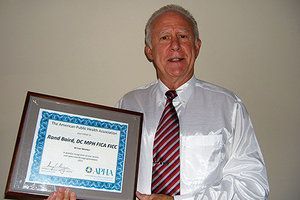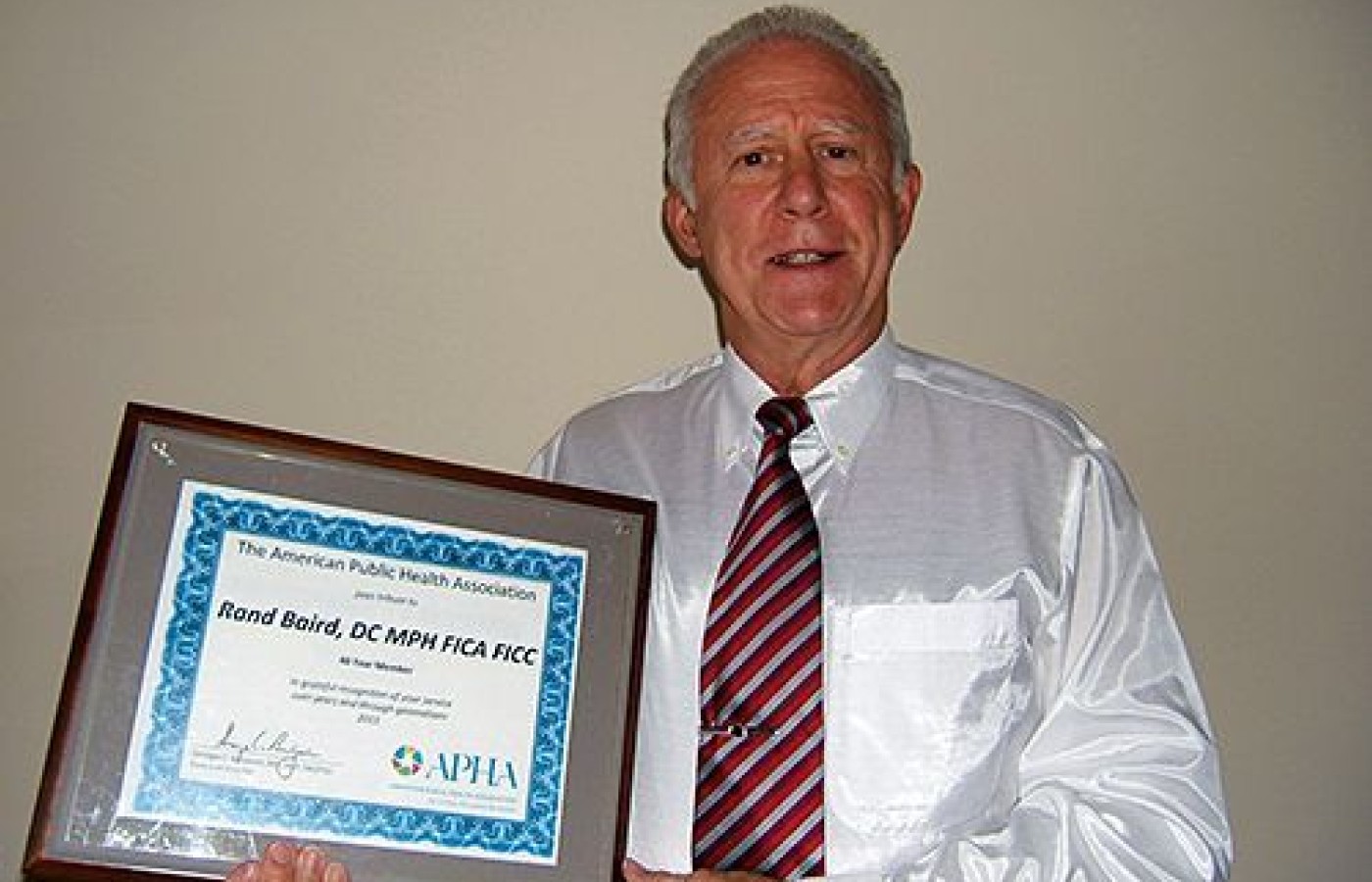It’s a new year and many chiropractors are evaluating what will enhance their respective practices, particularly as it relates to their bottom line. One of the most common questions I get is: “Do I need to be credentialed to bill insurance, and what are the best plans to join?” It’s a loaded question – but one every DC ponders. Whether you're already in-network or pondering whether to join, here's what you need to know.
Making Public Health a Chiropractic Priority
As highlighted in this edition's News in Brief, Rand Baird, DC, MPH, FICA, FICC, editor and occasional author of our long-running column, "Chiropractic in the American Public Health Association" (renamed "Chiropractic and the Public's Health" this year), was recognized by the organization recently for 40 years of membership. The following Q&A with Dr. Baird, who spearheaded development of the APHA Chiropractic Health Care section, provides insight into his decision to become a chiropractor and eventually join the APHA; his impressions of the state of public health, then and now; and lessons learned from his longtime membership in the organization.
How did you become interested in chiropractic? Although I did not know it until years later, my father was a chiropractor. He gave it up when the American Osteopathic Association broke up his partnership with an osteopath. He believed chiropractic could be eliminated, so he returned to his former occupation as a pharmacist and asked everyone not to speak of it again. I always knew he was a pharmacist, but he was called "Dr. Baird." Only years after he died did my mother finally tell me! So, I am in truth a second-generation chiropractor. It must be in the blood. I was always attracted by the non-drug, non-surgery approaches to health care.

What were you doing before becoming a chiropractor? I was a successful hospital and medical records administrator for eight years before deciding to go to chiropractic college. I worked in four of the largest hospitals in Chicago and Los Angeles. One of my three bachelor's degrees was in medical record administration; another in human psychology; and to those I added my MPH degree from the University of Illinois Medical Center. These made a great background for hospital management. I also got a bachelor's degree from CCC-LA in human biology.
Where (what school) and when did you graduate (DC degree)? I graduated from Cleveland Chiropractic College – Los Angeles in 1982 (now closed).
What was the state of public health in chiropractic at the time of your graduation? Chiropractic was outlawed in the APHA at that time by official APHA resolution #6903, passed in 1969, which stated the "APHA considers practice of chiropractic to be a hazard to the health and safety of our citizens." APHA membership was open to us then since we expressed an interest in public health, but there were less than 10 chiropractors in the APHA as of June 1979. We could join as members, as joining was not related to the degrees we held.
And of course, there was no chiropractic section or interest group at all then. My first personal goals as an APHA member became to increase our membership, supersede #6903, and establish a special primary-interest group called the Chiropractic Forum – SPIG [Special Primary Interest Group]. I achieved all three.
What made you decide to join the APHA (was this before or after you became a DC)? I was already a member of the APHA when I graduated, having joined in MPH graduate school. I only began chiropractic college years later.
What led to the development of what is now known as the Chiropractic Health Care (CHC) section in the APHA? The development of the Chiropractic Health Care section in APHA was one of my longer-term goals. First, we had to achieve as a SPIG in APHA for at least a few years. For this reason, I personally received an award for recruiting more new members than anyone in APHA history, making us the largest SPIG. Next, we had to write our justifications and debate them; then we had to apply for status. That was done by a team effort, and the Governing Council of the APHA approved section status for us in 1995.
What changes have you seen in the APHA over the past 40 years? In the past 40 years, I have seen APHA become more fair-minded, more open to alternative approaches, more receptive to chiropractic care, committed to a true team approach, and eager to have us participate at all levels. I'm proud to have been a part of APHA for 40 years.
Do you still have your original APHA membership card? Yes, I have the original APHA membership certificate.
What is so important about a DC being an APHA member? Public health puts the emphasis where it should be – on the public's health. I think every DC should be a member of the APHA.
What public health knowledge have you gained personally that you would not have obtained unless you were an APHA member? The contacts and social network from such a variety of disciplines were only possible through APHA. For example, I successfully invited the APHA Executive Director, Dr. Georges Benjamin, to speak at the WFC meeting in Montreal, and the U.S. Surgeon General, Dr. Regina Benjamin, to speak at the Parker Seminars Las Vegas. I had the credibility from my work with the APHA and the World Federation of Chiropractic.
What other information would you like to share about the APHA? Teaching public / community health is actually a rarity. Most DC / MPH degree holders have never taught public health. Most use their degrees in other ways. However, I taught public health for 25 years. I integrated public health with chiropractic using the APHA as my guide. This was very important to combine the theoretical and the practical. I learned more from teaching public health than even at my graduate school. I got a better perspective and better depth of knowledge, and made public health a priority mentality for chiropractors. Being part of the APHA made it all possible.
Editor's Note: Questions provided by Dr. Claire Johnson, APHA Chiropractic Health Care section communications chair and editor of National University of Health Sciences' research journals.



